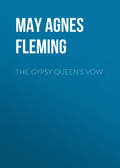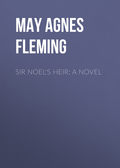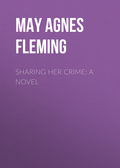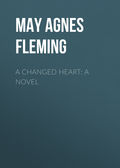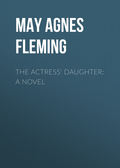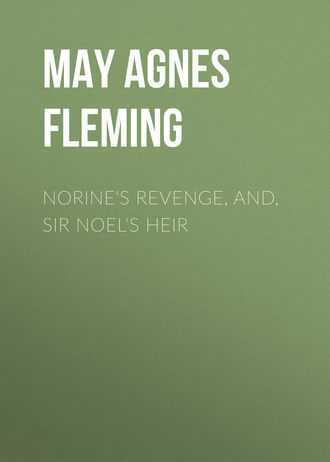
May Agnes Fleming
Norine's Revenge, and, Sir Noel's Heir
CHAPTER VIII.
LADY THETFORD'S BALL
Years came, and years went, and thirteen passed away. In all these years, with their countless changes, Thetford Towers had been a deserted house. Comparatively speaking, of course; Mrs. Weymore, the governess, Mrs. Hilliard, the housekeeper, Mr. Jarvis, the butler, and their minor satellites, served there still, but its mistress and her youthful son had been absent. Only little May had remained under Mrs. Weymore's charge until within the last two years, and then she, too, had gone to Paris to a finishing school.
Lady Thetford came herself to the Towers to fetch her – the only time in these thirteen years. She had spent them pleasantly enough, rambling about the Continent, and in her villa on the Arno, for her health was frail, and growing daily frailer, and demanded a sunny, Southern climate. The little baronet had gone to Eton, thence to Oxford, passing his vacation abroad with his mamma – and St. Gosport had seen nothing of them. Lady Thetford had thought it best, for many reasons, to leave little May quietly in England during her wanderings. She missed the child, but she had every confidence in Mrs. Weymore. The old aversion had never entirely worn away, but time had taught her she could trust her implicitly; and though May might miss "mamma" and Rupert, it was not in that flighty-fairy's nature to take their absence very deeply to heart.
Jocyln Hall was vacated, too. After that refusal of Lady Thetford, Colonel Jocyln had left England, placed his daughter in a school abroad, and made a tour of the East. Lady Thetford he had not met until within the last year; then Lady Thetford and her son, spending the winter in Rome, had encountered Colonel and Miss Jocyln, and they had scarcely parted company since. The Thetfords were to return early in spring to take up their abode once more in the old home, and Colonel Jocyln announced his intention of following their example.
Lady Thetford wrote to Mrs. Weymore, her viceroy, and to her steward, issuing her orders for the expected return. Thetford Towers was to be completely rejuvenated – new furnished, painted, and decorated. Landscape gardeners were set at work in the grounds; all things were to be ready the following June.
Summer came and brought the absentees – Lady Thetford and her son, Colonel Jocyln and his daughter; and there were bonfires and illuminations, and feasting of tenantry, and ringing of bells, and general jubilation, that the heir of Thetford Towers had come to reign at last.
The week following the arrival, Lady Thetford issued invitations over half the county for a grand ball. Thetford Towers, after over twenty years of gloom and solitude, was coming out again in the old gayety and brilliance that had been its normal state before the present heir was born.
The night of the ball came, and with it nearly every one who had been honored with an invitation, all curious to see the future lord of one of the noblest domains in broad Devonshire.
Sir Rupert Thetford stood by his mother's side, and met his old friends for the first time since his boyhood – a slender young man, pale, and dark, and handsome of face, with dreamy, artist's eyes and quiet manners, not at all like his father's fair-haired, bright-eyed, stalwart Saxon race; the Thetford blood had run out, he was his own mother's son.
Lady Thetford, grown pallid and wan, and wasted in all those years, and bearing within her the seeds of an incurable disease, looked yet fair and gracious, and stately in her trailing robes and jewels, to-night, receiving her guests like a queen. It was the triumph of her life, the desire of her heart, this seeing her son, her idol, reigning in the home of his fathers, ruler of the broad domain that had owned the Thetford's lord for more years back than she could count.
"If I could but see her his wife," Lady Thetford thought, "I think I should have nothing left on earth to desire."
She glanced across the wide room, along a vista of lights, and flitting forms, and rich dresses, and sparkling jewels, to where a young lady stood, the centre of an animated group – a tall and eminently handsome girl, with a proud patrician face, and the courtly grace of a young empress – Aileen Jocyln, heiress of fabulous wealth, possessor of fabulous beauty, and descendant of a race as noble and as ancient as his own.
"With her for his wife, come what might in the future, my Rupert would be safe," the mother thought; "and who knows what a day may bring forth. Ah! if I dared only speak, but I dare not; it would ruin all. I know my son."
Yes, Lady Thetford knew her son, understood his character thoroughly, and was a great deal too wary a conspirator to let him see her cards. Fate, not she, had thrown the heiress and the baronet constantly together of late, and Aileen's own beauty and grace were surely sufficient for the rest. It was the one desire of Lady Thetford's heart; but she never said so to her son, who loved her dearly, and would have done a great deal to add to her happiness. She left it to fate, and leaving it, was doing the wisest thing she could possibly do.
It seemed as if her hopes were likely to be realized. Sir Rupert had an artist's and a Sybarite's love for all things beautiful, and could appreciate the grand statuesque style of Miss Jocyln's beauty, even as his mother could not appreciate it. She was like the Pallas Athene, she was his ideal woman, fair and proud, uplifted and serene, smiling on all, from the heights of high-and-mightydom, but shining upon them, a brilliant far-off star, keeping her warmth and her sweetness all for him. He was an indolent, dreamy Sybarite, this pale young baronet, who liked his rose-leaves unruffled under him, full of artistic tastes and inspirations, and a great deal too lazy ever to carry them into effect. He was an artist, and he had his studio where he began fifty gigantic deeds at once in the way of pictures, and seldom finished one. Nature had intended him for an artist, not a country squire; he cared little for riding, or hunting, or fishing, or farming, any of the things wherein country squires delight; he liked better to lie on the warm grass, with the summer wind stirring in the trees over his head, and smoke his Turkish pipe, and dream the lazy hours away. If he had been born a poor man, he might have been a clever painter; as it was, he was only an idle, listless, elegant, languid dreamer, and so likely to remain until the end of the chapter.
Lady Thetford's ball was a very brilliant affair, and a famous success. Until far into the gray and dismal dawn, "flute, violin, bassoon," woke sweet echoes in the once gloomy rooms, where so long silence had reigned. Half the county had been invited, and half the county were there; hosts of pretty, rosy girls, in laces and roses, and sparkling jewelry, baited their dainty traps, and tried "becks and nods, and wreathed smiles," for the special delectation of the handsome, courtly heir of Thetford Towers.
But the heir of Thetford Towers, with gracious greetings for all, yet walked through the rose-strewn pitfalls quite secure, while the starry face of Aileen Jocyln shone on him in its pale, high-bred beauty. He had not danced much; he had an antipathy to dancing as he had to exertion of any kind, and presently he stood leaning against a slender white column, watching her in a state of lazy admiration. He could see quite as clearly as his mother how eminently proper a marriage with the heiress of Col. Jocyln would be; he knew by instinct, too, how much she desired it; and it was easy enough, looking at her in her girlish pride and beauty, to fancy himself very much in love; and, though anything but a coxcomb, Sir Rupert Thetford was perfectly aware of his own handsome face and dreamy artist's eyes, and his fifteen thousand a year, and lengthy pedigree, and had a hazy idea that the handsome Aileen would not say no when he spoke.
"And I'll speak to-night, by Jove!" thought the young baronet, as near being enthusiastic as was in his nature, while he watched her, the brilliant centre of a brilliant group. "How exquisite she is in her statuesque grace, my peerless Aileen, the ideal of my dreams. I'll ask her to be my wife to-night, or that inconceivable idiot, Lord Gilbert Penryhn will do it to-morrow."
He sauntered over to the group, not at all insensible to the quick, bright smile and flitting flush with which Miss Jocyln welcomed him.
"I believe this waltz is mine, Miss Jocyln. Very sorry to break upon your tête-à-tête, Penryhn, but necessity knows no law."
A moment and they were floating down the whirling tide of the dance, with the wild, sweet waltz music swelling and sounding, and Miss Jocyln's perfumed hair breathing fragrance around him, the starry face and dark, dewy eyes, downcast a little, in a happy tremor. The cold, still look of fixed pride seemed to melt out of her face, and an exquisite rosy light came and went in its place, making her more lovely than ever; and Sir Rupert saw and understood it all, with a little complacent thrill of satisfaction.
They waltzed out of the ball-room into a conservatory of exquisite blossom, where tropic plants of gorgeous hues, and plashing fountains, under the white light of alabaster lamps, made a sort of garden of Eden. There were orange and myrtle trees oppressing the warm air with their sweetness, and through the open, French windows came the soft, misty moonlight, and the saline wind. There they stopped, looking out at the pale glory of the night, and there Sir Rupert, about to ask the supreme question of his life, and with his heart beginning to plunge against his side, opened conversation with the usual brilliancy in such cases.
"You look fatigued, Miss Jocyln. These great balls are great bores after all."
Miss Jocyln laughed frankly. She was of a nature far more impassioned than his, and she loved him; and she felt thrilling through every nerve in her body the prescience of what he was going to say; but for all that, being a woman, she had the best of it now.
"I am not at all fatigued," she said; "and I like it. I don't think balls are bores – like this, I mean; but then, certainly, my experience is very limited. How lovely the night is! Look at the moonlight, yonder, on the water, a sheet of silvery glory. Does it not recall Sorrento, and the exquisite Sorrentine landscape – that moonlight on the sea? Are you not inspired, sir artist?"
She lifted a flitting, radiant glance, a luminous smile, and then the star-like face drooped again – and the white hands took to reckless breaking off sweet sprays of myrtle.
"My inspiration is nearer," looking down at the drooping face. "Aileen – " and there he stopped, and the sentence was never destined to be finished, for a shadow darkened the moonlight, a figure flitted in like a spirit, and stood before them – a fairy figure, in a cloud of rosy drapery, with shimmering, golden curls, and dancing eyes of turquoise blue.
Aileen Jocyln started back, and away from her companion, with a faint, surprise cry. Sir Rupert, wondering and annoyed, stood staring; and still the fairy figure in the rosy gauze stood like a nymph in a stage tableau, smiling up in their faces, and never speaking. There was a blank pause of a moment, then Miss Jocyln made one step forward, doubt, recognition, delight, all in her face at once.
"It is – it is!" she cried, "May Everard!"
"May Everard!" Sir Rupert echoed – "little May!"
"At your service, monsieur. To think you should have forgotten me so completely in a decade of years. For shame, Sir Rupert Thetford!"
And then she was in Aileen Jocyln's arms, and there was an hiatus filled up with kisses.
"Oh! what a surprise." Miss Jocyln cried, breathlessly. "Have you dropped from the skies? I thought you were in France."
May Everard laughed, the mischievous laugh of thirteen years ago, as she held up her dimpled cheeks, first one and then the other, to Sir Rupert.
"Did you? So I was, but I ran away."
"Ran away! From school?"
"Something very like it. Oh! how stupid it was, and I couldn't endure it any longer; and I am so filled with knowledge now, that if I held any more, I should explode; and so when vacation began, and I was permitted to spend a week with a friend I just took French leave and came home instead. And so," folding the fairy hands, and nodding her little ringleted head, "here I am."
"But, good heavens!" cried Sir Rupert, aghast, "you never mean to say, May, you have come alone."
"All alone," said May, with another nod. "I'm used to it, you know; did it last vacation. Came across and spent it with Mrs. Weymore. I don't mind it the least; don't know what sea-sickness is; and oh! didn't some of the poor wretches suffer! Isn't it fortunate I'm here for the ball? And, Rupert, good gracious! how you've grown!"
"Thanks. I can't see that you have changed much, Miss Everard. You are the same curly-haired, saucy fairy I knew thirteen years ago. What does my lady say to this escapade?"
"Nothing. Eloquent silence best expresses her feelings; and then she hadn't time to make a scene. Are you going to ask me to dance, Rupert? because, if you are," said Miss Everard, adjusting her bracelet, "you had better do it at once, as I am going back to the ball-room, and after I once appear there, you will stand no chance amongst the crowd of competitors. But, then, perhaps you belong to Miss Jocyln?"
"Not at all," Miss Jocyln interposed hastily, and reddening a little, "I am engaged; and it is time I was back, or my unlucky cavalier will be at his wit's end to find me."
She swept away with a quicker movement than usual, and Sir Rupert laughingly gave his piquant little partner his arm. His notions of propriety were a good deal shocked; but then it was only May Everard, and May Everard was one of those exceptional people who can do pretty much as they please, and not surprise any one. They went back to the ball-room, the fairy in pink on the arm of the young baronet, chattering like a magpie. Miss Jocyln's partner found her and led her off, but Miss Jocyln was very silent and distrait all the rest of the night, and watched furtively, but incessantly, the fluttering pink fairy. She had reigned belle hitherto, but sparkling little May, like an embodied sunbeam, electrified the room, and took the crown and the sceptre by royal right. Sir Rupert had that one dance, and no more – Miss Everard's own prophecy was true – the demand for her was such that even the son of the house stood not the shadow of chance.
Miss Jocyln held herself aloof from the young baronet for the remaining hours of the ball. She had known as well as he the words that were on his lips when May Everard interposed; and her eyes flashed, and her dark cheeks flushed dusky red to see how easily he had been deterred from his purpose. For him, he sought her once or twice in a desultory sort of way, never observing that he was purposely avoided, wandering contentedly back to devote himself to some one else, and in the pauses to watch May Everard floating – a sunbeam in a sunny cloud – here and there, and everywhere.
CHAPTER IX.
GUY LEGARD
"He meant to have spoken that night; he would have spoken but for May Everard. And yet that is two weeks ago, and we have been together since, and" – Aileen Jocyln broke off abruptly, and looked out over the far spreading gray sea.
The morning was dull; the leaden sky threatening rain; the wind sighing fitfully, and the slow, gray sea creeping up the gray sands. Aileen Jocyln sat as she had sat since breakfast, aimless and dreary, by her dressing-room window, gazing blankly over the pale landscape, her hair falling loose and damp over her shoulders, a novel lying listlessly in her lap. The book had no interest – her thoughts would stray in spite of her to Thetford Towers.
"She is very pretty," Miss Jocyln thought, "with that pink and white wax-doll sort of prettiness that some people admire. I never thought he could, with his artistic nature; but I suppose I was mistaken. They call her fascinating; I believe that rather hoydenish manner of hers, all those dashing airs, and that 'loud' style of dress and doings, take some men by storm. I presume I was mistaken in Sir Rupert; I dare say pretty, penniless May will be Lady Thetford before long."
Miss Jocyln's short upper-lip curled rather scornfully, and she rose up with a little air of petulance, and walked across the room to the opposite window. It commanded a view of the lawn and a long wooded drive, and cantering airily up under the waving trees, she saw the young lady of whom she had been thinking. The pretty, fleet-footed pony and his bright little mistress were by no means rare visitors at Jocyln Hall; and Miss Jocyln was always elaborately civil to Miss Everard. Very pretty little May looked, all her tinselled curls floating in the breeze, like a golden banner, the blue eyes more starily radiant than ever; the dark riding-habit and jaunty hat and plume the most becoming things in the world. She saw Miss Jocyln at the window, kissed her hand, and resigned Arab to the groom. A minute more, and she was saluting Aileen with effusion.
"You solemn Aileen! to sit and mope here in the house instead of improving your health and temper by a breezy canter over the downs. Don't contradict, I know you were moping. I should be afraid to tell you how many miles Arab and I have got over this morning. And you never came to see me yesterday, either. Why was it?"
"I didn't feel inclined," Miss Jocyln answered truthfully.
"No, you never do feel inclined unless I come and drag you out by force; you sit in the house and grow yellow and jaundiced over high-church novels. I declare I never met so many lazy people in all my life as I have done since I came home. One don't mind mamma, poor thing! shutting herself up, and the sunshine and fresh air of heaven out – but for you and Rupert, and speaking of Rupert," ran on Miss Everard, in a breathless sort of way, "he wanted to commence his great picture of 'Fair Rosamond and Eleanor' yesterday – and how could he when Eleanor never came. Why didn't you – you promised?"
"I changed my mind, I suppose."
"And broke your word – more shame for you, then! Come now."
"No; thanks. It's going to rain."
"Nothing of the sort; and Rupert is so anxious. He would have come himself, only my lady is ill to-day with one of her bad headaches, and asked him to read her to sleep; and like the good boy that he is in the main, though shockingly lazy, he obeyed. Do come, Aileen, there's a dear! Don't be selfish."
Miss Jocyln rose rather abruptly.
"I have no desire to be selfish, Miss Everard. If you will wait ten minutes while I dress, I will accompany you to Thetford Towers."
She rang the bell, and swept from the room stately and uplifted. May looked after her, fidgeting a little.
"Dear me! I suppose she is offended now at that word 'selfish.' I never did get on very well with Aileen Jocyln, and I'm afraid I never shall. I shouldn't wonder if she were jealous."
Miss Everard laughed a little silvery laugh all to herself, and slapped her kid riding-boot with her pretty toy whip.
"I hope I didn't interrupt a tender declaration that night in the conservatory; but it looked like it. If I did I am sure Rupert has had fifty chances since, and I know he hasn't availed himself of them, or Aileen would never wear that dissatisfied face. I know she's in love with him, though, to be sure, she would see me impaled with the greatest pleasure if she only thought I suspected it; but I'm not so certain about him. He's a great deal too indolent, in the first place, to get up a grand passion for anybody; and I think he's inclined to look graciously on me – poor little me – in the second. You may spare yourself the trouble, my dear Sir Rupert, for a gentleman whose chief aim in existence is to smoke Turkish pipes, and lie on the grass, and write and read poetry, is not at all the sort of man I mean to bless for life.
"Tell me not of your soft sighing lovers,
Such things may be had by the score;
I'd rather be bride to a rover,
And polish the rifle he bore."
Sang May Everard, in a gay little voice as Miss Jocyln, in a flowing riding habit, entered the room.
The two girls descended to the court-yard, mounted, and rode off. Both rode well and both looked their best on horseback, and made a wonderfully pretty picture as they galloped through St. Gosport in dashing style, bringing the admiring population in a rush to doors and windows. Perhaps Sir Rupert Thetford thought so, too, as he stood at the great front entrance to receive them with a kindling light in his artist's eyes.
"May said she would fetch you, and May always keeps her word," he said, as he walked slowly up the sweeping staircase; "besides, Aileen, I am to have the first sitting for the 'Rosamond and Eleanor' to-day, am I not? May calls me an idle dreamer, a useless drone in the busy human hive; so, to vindicate my character, and cleave a niche in the temple of fame, I am going to immortalize myself over this painting."
"You'll never finish it," said May; "it will be like all the rest. You'll begin on a gigantic scale and with super-human efforts, and you'll cool down and get sick of it before it is half finished; and it will go to swell the pile of daubed canvas in your studio now. Don't tell me! I know you."
"And have the poorest possible opinion of me, Miss Everard?"
"Yes, I have! I have no patience when I think of what you might do, what you might become, and see what you are. If you were not Sir Rupert Thetford, with a princely income, you might be a clever man. As it is – " a shrug, and a lift of the eyebrows.
"As it is!" cried the young baronet, trying to laugh and reddening violently, "I will still be a clever man – a modern Murillo. Are you not a little severe, Miss Everard; Aileen, I believe this is your first visit to my studio?"
"Yes," said Miss Jocyln, coldly and briefly. She did not like the conversation, and May Everard's familiar home-truths stung her. To her he was everything mortal man should be. She was proud, but she was not ambitious; what right had this penniless little free-speaker to come between them and talk like this?
May was flitting about like the fairy she was, her head a little on one side, like a critical canary, her flowing skirt held up, inspecting the pictures.
"'Jeannie D'Arc before her Judges,' half finished, as usual, and never to be completed; and weak – very, if it ever is completed. 'Battle of Bosworth Field,' in flaming colors, all confusion and smoke, and red ochre and rubbish, you did well not to trouble yourself any more with that. 'Swiss Peasant,' ah! that is pretty. 'Storm at Sea,' just tolerable. 'Trial of Marie Antoinette.' My dear Rupert, why will you persist in these figure paintings when you know your forte is landscape? 'An Evening in the Eternal City.' Now that is what I call an exquisite little thing? Look at the moon, Aileen, rising over these hill tops; and see those trees – you can almost feel the wind blow! And that prostrate figure – why, that looks like yourself, Rupert!"
"It is myself."
"And the other stooping – who is he?"
"The painter of that picture, Miss Everard; yes, the only thing in my poor studio you see fit to eulogize, is not mine. It was done by an artist friend – an unknown Englishman, who saved my life in Rome three years ago. Come in, mother mine, and defend your son from the two-edged sword of May Everard's tongue."
For Lady Thetford, pale and languid, appeared on the threshold, wrapped in a shawl.
"It's all for his good, mamma. Come here and look at this 'Evening in the Eternal City.' Rupert has nothing like it in all his collection, though there are the beginning of many better things. He saved your life? How was it?"
"Oh! a little affair with brigands; nothing very thrilling, but I should have been killed or captured all the same if this Legard had not come to the rescue. May is right about the picture; he painted well, had come to Rome to perfect himself in his art. Very fine fellow, Legard – a thorough Bohemian."
"Legard!"
It was Lady Thetford who had spoken sharply and suddenly. She had put up her glass to look at the Italian picture, but dropped it, and faced abruptly round.
"Yes, Legard. Guy Legard, a young Englishman, about my own age. By-the-by, if you saw him, you would be surprised by his singular resemblance to some of those dead and gone Thetfords hanging over there in the picture-gallery – fair hair, blue eyes, and the same peculiar cast of features to a shade. I was taken rather aback, I confess, when I saw it first. My dear mother – "
It was not a cry Lady Thetford had uttered – it was a kind of wordless sob. He soon caught her in his arms, and held her there, her face the color of death.
"Get a glass of water, May – she is subject to these attacks. Quick!"
Lady Thetford drank the water, and sunk back in the chair Aileen wheeled up, her face looking awfully corpse-like in contrast with her dark garments and dead black hair.
"You should not have left your room," said Sir Rupert, "after your attack this morning. Perhaps you had better return and lie down. You look perfectly ghastly."
"No," his mother sat up as she spoke and pushed away the glass, "there is no necessity for lying down. Don't wear that scared face, May – it was nothing, I assure you. Go on with what you were saying, Rupert."
"What I was saying? what was it?"
"About this young artist's resemblance to the Thetfords."
"Oh! well, there's no more to say, that is all. He saved my life, he painted that picture, and we were Damon and Pythias over again during my stay in Rome. I always do fraternize with these sort of fellows, you know. I left him in Rome, and he promised, if he ever returned to England, which he wasn't so sure of, he would run down to Devonshire to see me and my painted ancestors, whom he resembles so strongly. That is all; and now young ladies if you will take your places, we will commence the Rosamond and Eleanor. Mother, sit here by this window, if you want to play propriety, and don't talk."
But Lady Thetford chose to go to her own room; and her son gave her his arm thither, and left her lying back amongst her cushions in front of the fire. It was always chilly in those great and somewhat gloomy rooms, and her ladyship was always cold of late. She lay there looking with gloomy eyes into the ruddy blaze, and holding her hands over her painfully beating heart.
"It is destiny, I suppose," she thought, bitterly; "let me banish him to the farthest end of the earth; let me keep him in poverty and obscurity all his life, and when the day comes that it is written, Guy Legard will be here. Sooner or later, the vow I have broken to Sir Noel Thetford must be kept; sooner or later, Sir Noel's heir will have his own."



